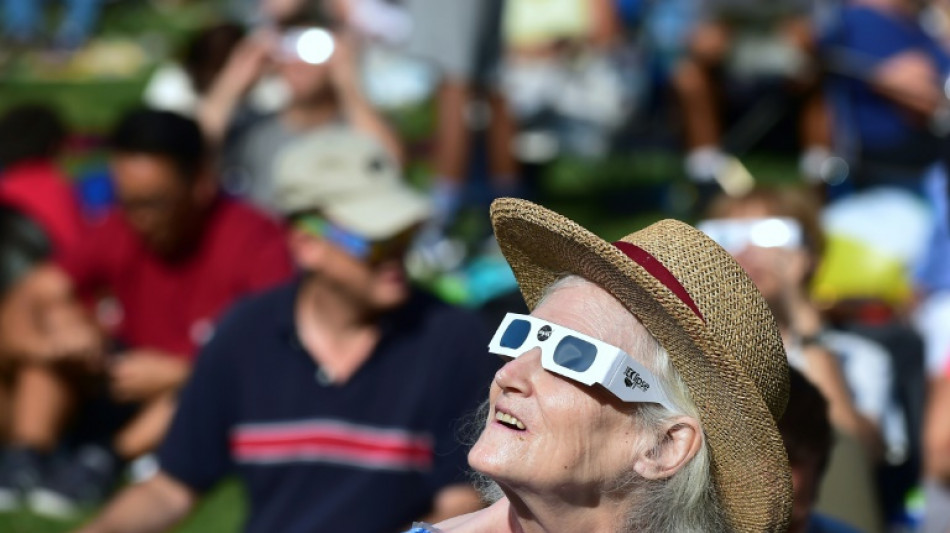
-
 SFWJ / Medcana Announces Strategic Expansion Into Australia With Acquisition of Cannabis Import and Distribution Licenses
SFWJ / Medcana Announces Strategic Expansion Into Australia With Acquisition of Cannabis Import and Distribution Licenses
-
Spurs players 'never lost belief', says Postecoglou

-
 Man Utd stun Lyon in nine-goal Europa League classic to reach semis
Man Utd stun Lyon in nine-goal Europa League classic to reach semis
-
Netflix earnings in first quarter of 2025 top forecasts

-
 Trump says US 'talking' to China on tariffs
Trump says US 'talking' to China on tariffs
-
Salvadoran soldiers stop US senator near prison holding expelled migrant

-
 Solanke penalty sends Spurs to Europa League semis
Solanke penalty sends Spurs to Europa League semis
-
CAF crackdown after trouble in African club matches

-
 Trump talks up EU tariff deal as Italy's Meloni visits
Trump talks up EU tariff deal as Italy's Meloni visits
-
Trump insists he could fire independent Fed Chair Powell

-
 Google has illegal monopoly in ad tech, US judge rules
Google has illegal monopoly in ad tech, US judge rules
-
Trump softens on Zelensky, says mineral deal coming 'soon'

-
 Jacks helps Mumbai beat Hyderabad in IPL
Jacks helps Mumbai beat Hyderabad in IPL
-
Countries must 'make the best' of new multipolar world: IMF chief

-
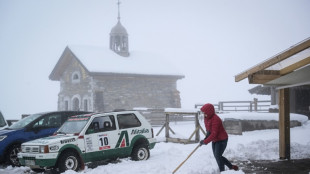 Heavy spring snow storm wreaks havoc in the Alps
Heavy spring snow storm wreaks havoc in the Alps
-
US judge rules against Google in online ad tech antitrust case

-
 Andreeva knocked out by Alexandrova in Stuttgart last 16
Andreeva knocked out by Alexandrova in Stuttgart last 16
-
Iran challenges four countries in UN court over jet it downed in 2020

-
 'Not at 50' - Alonso sets retirement limit
'Not at 50' - Alonso sets retirement limit
-
Macron praises US-European-Ukraine talks as 'important occasion for convergence'

-
 Verstappen dismisses Red Bull exit fears
Verstappen dismisses Red Bull exit fears
-
Italy's Meloni, Trump talk up EU trade deal hopes

-
 'Slow but steady' progress for Martin after Qatar MotoGP crash
'Slow but steady' progress for Martin after Qatar MotoGP crash
-
Pogacar-Van der Poel duel inspires Evenepoel comeback

-
 US judge rules Google monopolized online ad tech market
US judge rules Google monopolized online ad tech market
-
Bearman back at 'special' debut-track Jeddah

-
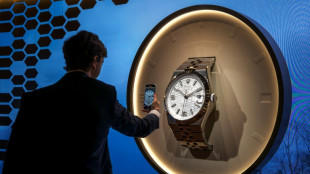 Swiss watch exports to US soared ahead of Trump tariffs
Swiss watch exports to US soared ahead of Trump tariffs
-
Alcaraz finds best to reach Barcelona Open quarters

-
 Where are all the aliens?: Fermi's Paradox explained
Where are all the aliens?: Fermi's Paradox explained
-
France full-back Dulin to retire at end of season

-
 World economy likely to avoid recession despite tariffs: IMF chief
World economy likely to avoid recession despite tariffs: IMF chief
-
57 killed in Sudan's Darfur as trapped civilians fear bloodbath

-
 Vietnam ups wind, solar targets as energy demand soars
Vietnam ups wind, solar targets as energy demand soars
-
Pope says doing 'best he can' on jail visit before Easter

-
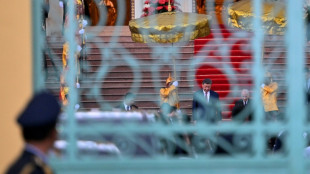 China's Xi meets Cambodian leader as part of regional diplomatic blitz
China's Xi meets Cambodian leader as part of regional diplomatic blitz
-
Ukrainian tennis player seeks legal justice over 'moral abuse'

-
 Italy's Meloni seeks EU tariff deal from Trump
Italy's Meloni seeks EU tariff deal from Trump
-
France's feminist icon Pelicot to sue Paris Match for privacy invasion

-
 World economy should avoid recession despite tariffs, IMF chief says
World economy should avoid recession despite tariffs, IMF chief says
-
Stocks waver as ECB cuts rate, Trump slams Fed chief

-
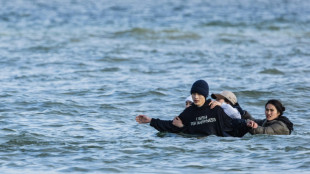 France, UK mull migrant swaps in bid to stem Channel crossings
France, UK mull migrant swaps in bid to stem Channel crossings
-
Nuno says Forest still in control of Champions League chase

-
 Malinin, Liu help US take early lead at skating's World Team Trophy
Malinin, Liu help US take early lead at skating's World Team Trophy
-
Clashes in Sudan's besieged Darfur city kill 57

-
 Kyiv's Europe allies seek influence with US in Paris talks
Kyiv's Europe allies seek influence with US in Paris talks
-
Russia scraps Taliban's 'terror' label amid warming ties

-
 Trump says Fed chief's 'termination cannot come fast enough'
Trump says Fed chief's 'termination cannot come fast enough'
-
China's Xi, seeking to build regional ties, meets Cambodian leader
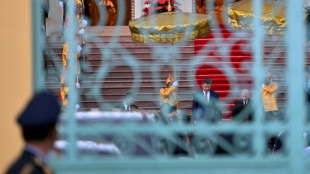
-
 ECB cuts rates as Trump tariffs raise fears for eurozone growth
ECB cuts rates as Trump tariffs raise fears for eurozone growth
-
Etzebeth returns to Sharks lineup after concussion absence


Why unprotected eclipse gazing will leave you seeing stars
Just a single, unguarded glance at a solar eclipse can result in a lifetime of vision loss, eye health experts warn.
On Monday, tens of millions of spectators across Mexico, the United States and Canada will witness the Moon completely obscure the Sun's light, a rare celestial spectacle that won't be visible for most of North America again until 2044.
Medical literature is teeming with examples of people who suffered damage to their retinas -- the layer of light-sensitive tissue at the back of the eye -- and health professionals are offering advice on how to avoid becoming the next cautionary tale.
Aaron Zimmerman, a clinical professor of optometry at the Ohio State University, told AFP that the dangers of sungazing during eclipses were discussed by the ancient Greek philosopher Socrates, but it wasn't until recently that science really caught up with how eye injury happened.
When it comes to eclipses, he explained, the main damage comes from "photochemical toxicity," where short, high-energy wavelengths of light -- blues, violets and non-visible ultraviolets -- trigger chemical reactions that damage the rods and cones of the retina.
Cue visits to the emergency department by people with complaints of blurry vision, changes in color perception, and blind spots, with the outlook for recovery far from certain.
Human beings inherently look away from the Sun because of the discomfort it causes, but during eclipses "you can psychologically override" that instinct, explained Zimmerman.
A famous journal report about the 2017 US solar eclipse involved a woman in her twenties who presented to the New York Eye and Ear Infirmary after looking at the solar rim "several times for approximately 6 seconds without protective glasses" and then later with eclipse glasses.
Hours later, objects started to look fuzzy and out of shape, colors became distorted, and she developed a central black spot in her left eye.
An advanced imaging technique was able to show the damage at the cellular level which persisted on her follow up six weeks later.
- 'Permanent blank spot' -
Young adults might be more susceptible, the authors of the paper said, because of larger pupils, clearer eye structure, or "poorer recognition of the dangers" of viewing eclipses with improper eyewear.
"In some cases, it's just partially damaged and it may resolve so that you don't notice it anymore," Neil Bressler, a professor of ophthalmology at Johns Hopkins University and editor-in-chief of JAMA Ophthalmology told AFP. If recovery happens, it's normally within the first six months.
"But in other cases, it can leave a permanent blank spot... and we don't have a treatment to reverse that. It's like brain tissue, once you lose it, it won't grow back," added Bressler.
The best way to view the eclipse is with eclipse sunglasses, which block out 99.999 percent of light. Always go for genuine products. To test if your glasses are up to standard, "find the brightest light bulb in your home -- and then look at that from up close and you should barely be able to see the light," said Zimmerman.
If it's too late to procure specialist eyewear, then there are indirect methods, such as punching a pinhole into a cardboard and letting the light shine onto another surface, or even using the humble kitchen colander to the same effect. NASA's webcast is another option.
Those fortunate enough to be in the "path of totality," under which the Moon will fully block out the Sun, can look up without glasses and admire the Sun's outer atmosphere, or corona, glowing from behind the silhouette of the Moon.
But, said Bressler, the danger is not having protection before and after those precious moments, which can last anywhere from seconds to a few minutes, depending on your location.
"You must know when it begins and use protection before that, and you may be enamored by looking at all this, but you must have some alarm to tell you it's about to end," he warned.
M.A.Colin--AMWN


